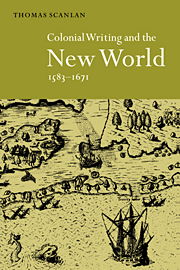Book contents
- Frontmatter
- Contents
- List of illustrations
- Acknowledgments
- Introduction
- 1 The allegorical structure of colonial desire
- 2 Fear and love: two versions of Protestant ambivalence
- 3 Forgoing the nation: the Irish problem
- 4 Preaching the nation: the sermon as promotion
- 5 Love and shame: Roger Williams and A Key into the Language of America
- 6 Fear and self-loathing: John Eliot's Indian Dialogues
- Coda
- Notes
- Index
4 - Preaching the nation: the sermon as promotion
Published online by Cambridge University Press: 04 December 2009
- Frontmatter
- Contents
- List of illustrations
- Acknowledgments
- Introduction
- 1 The allegorical structure of colonial desire
- 2 Fear and love: two versions of Protestant ambivalence
- 3 Forgoing the nation: the Irish problem
- 4 Preaching the nation: the sermon as promotion
- 5 Love and shame: Roger Williams and A Key into the Language of America
- 6 Fear and self-loathing: John Eliot's Indian Dialogues
- Coda
- Notes
- Index
Summary
Some fifty years ago, quite against the grain of the historiographical orthodoxy of the moment, Perry Miller argued that the significance of religion in the development of the Virginia colony needed to be reassessed. Challenging as too simplistic the widely held view that figured the Virginia colony as primarily or exclusively a commercial endeavor, Miller argued that the commercialism of the Virginia undertaking was, from very early on, articulated within an explicitly Protestant frame. For his evidence, Miller pointed to a group of early seventeenth-century sermons that explicitly extolled the Christian virtues of participation in the Virginia colony. The divines who wrote these sermons skillfully wove together the themes of financial gain and spiritual salvation as they attempted to convince their listeners and readers that England's colonial adventures were the perfect way to serve God. “The Virginia Company,” Miller wrote, “being an English enterprise, was not only Christian but specifically Protestant … the quality of their piety, their sense of their relation to God, was so thoroughly Protestant as to be virtually indistinguishable from the Puritan.” These Virginia sermons do indeed reveal a determination on the part of their authors to cast England's earliest colonial efforts in explicitly Protestant terms. And Miller is also correct to argue that the “the quality of their piety” is difficult to distinguish from that of the better known Puritan divines who later migrated to New England. Indeed, as John Parker has argued in reference to the same sermons, “This was the voice of Puritanism, giving English colonization literature a strong, clear purpose in an appeal made directly to the people.
- Type
- Chapter
- Information
- Colonial Writing and the New World, 1583–1671Allegories of Desire, pp. 93 - 122Publisher: Cambridge University PressPrint publication year: 1999



